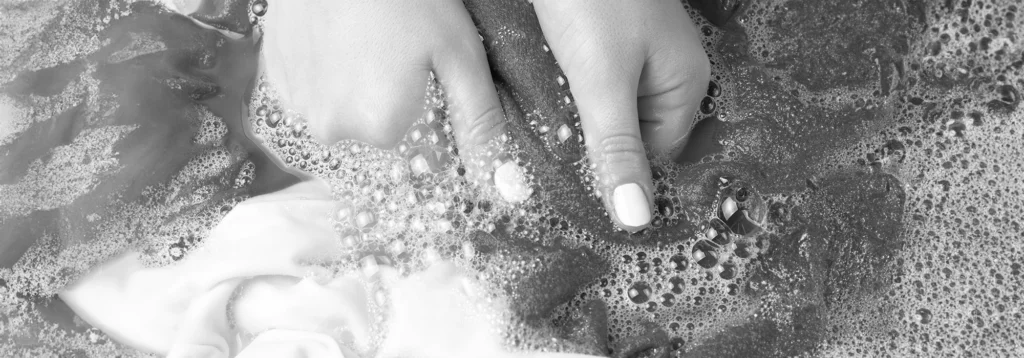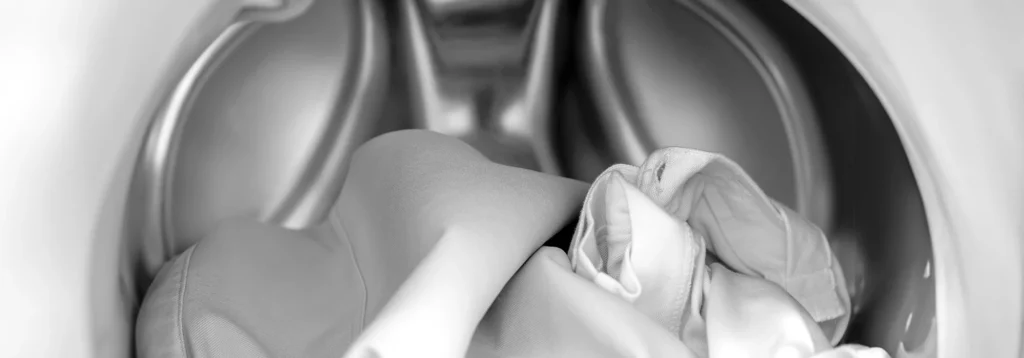Whether during a trip or in the comfort of your home, to keep a Merino wool garment intact and last for a long time, 3 fundamental steps are necessary, and we will summarize them below.
Merino wool fiber, in fact, is a natural and delicate material that undergoes the effects of the treatments and which, if done incorrectly, inevitably bring visible consequences on the garment.
Before washing any product, it is essential to always read the label and follow the instructions provided by the manufacturer.
Follow the simple rules that apply to wool and we summarized in this article by creating a real guide to read when needed.
Step 1 first of all involves washing. There are two ways in which a wool garment can be washed: by hand or in the washing machine
Once the washing is finished, the garments must be immediately removed from the drum to avoid felting that can happen if they remain wet on the bottom of the washing machine.

Hand Washing
The first option is the oldest and safest solution, as it allows you to treat the fabric gently and not stress the fiber. However, even in this case, specific measures are needed.
The water temperature must be kept constant and can be cold or lukewarm, but never hot as it could felt the fiber.
Concerning the soap, you can pre-treat the area that has any stains with Marseille soap and then immerse the garment in a basin or sink containing warm water and mild soap for wool or a few flakes of Marseille soap.
At this point, just lather the garment by moving it gently in the water, without twisting or squeezing it, and then change the water in order to rinse everything and eliminate the soap residue that otherwise helps to harden the fiber.
After rinsing, the garment will be pressed gently between two wipes in order to eliminate the excess of water without squeezing or twisting it.
This type of washing is particularly suitable for those who bring their Rewoolution garments with them while traveling, as it is easily applicable using a basin and simple Marseille soap

Machine Washing
The second washing method, on the other hand, consists in using the washing machine. Also in this case it is important to always check the label of the garment, as wool, to be washed in the washing machine, must have certain characteristics that allow it not to shrink or felt during mechanical washing.
If it is allowed, the garments must be inserted inside out in order to prevent any writings or logos from being damaged by friction. Furthermore, it is mandatory to use the special cycle for wool garments or delicate garments, which must be set at a maximum temperature of 30 degrees and without spinning or reducing it to a minimum, avoiding the use of softeners and bleaches and using only detergent made for delicate fabrics.
Once the washing is finished, the garments must be immediately removed from the drum to avoid felting that can happen if they remain wet on the bottom of the washing machine.
Drying
For drying, Rewoolution garments cannot be placed in the dryer, but, if possible, they should be laid horizontally on a drying rack in order to prevent excessive stress on the fiber, avoiding direct exposure to the sun or sources of excessive heat such as radiators or stoves.
As for ironing, however, it is important to iron the wool at low temperatures and possibly using steam to revive the fiber. Instead, it should be avoided to superimpose the hot iron on logos or writings to prevent them from being damaged.
Finally, to keep them at their best, place them in the drawers by adding a fabric bag containing dried lavender or a stick soaked in lavender, thyme or cedar essential oil. With this natural method you will avoid the formation of the holes typically associated with moths and the garments will have a fantastic scent.
Also, don’t forget that Merino wool fabrics are naturally breathable and thermoregulating and prevent the formation of unpleasant odors. This therefore allows to reduce the number of washes of garments made with this material, impacting less and less on the environment, as well as not dispersing microplastics during washing unlike polyester garments. A natural, sustainable and conscious choice!



















